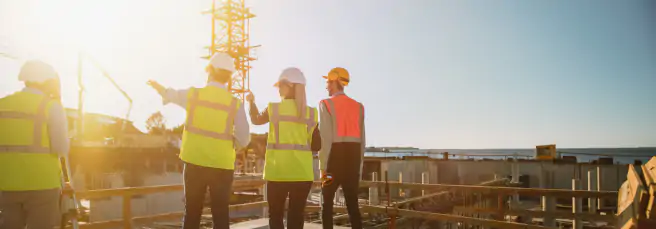

Commercial property surveys are different from residential surveys in a number of ways, not least because they are far more comprehensive. These types of surveys also tend to focus on more than just a monetary valuation, taking into account the client’s business needs. For those involved in commercial property, whether you’re a landlord or you’re buying or selling commercial premises, here’s our guide to commercial building surveys, what they involve and the benefits of investing in one.
An Overview of Commercial Building Surveys
Commercial building surveys differ depending on the client’s specific needs – at Bradley-Mason LLP, we firmly believe that the reports and surveys we provide should be tailored to the specific requirements of the client. However, there are certain types of building surveys which are more common than others and cater to clients in a host of different industries and sectors.
A commercial building survey provides a detailed report of the building, from the condition of each aspect to any defects that have been observed and the maintenance that may need to be addressed in the future. The report will include any implications of Listed Buildings or liability concerns, as well as helping to assist with negotiations.
A building survey report is designed to focus your attention on any potential problems that may arise in the future and to identify if further investigations are needed. This may include looking at the energy efficiency of the building, mechanical, electrical and plumbing investigations and drainage investigations.
Commercial building surveys are the most comprehensive reports and are conducted by Chartered Building Surveyors. Every element of a property will be examined, from the roof to the floors and the walls. This report will inform you of the construction type and provide you with as much information about the property as possible, whether you already occupy it or you’re about to take on the lease.
A schedule of condition survey is an important document for commercial properties, which describes and records images of the condition of the building. It can be used as evidence for any claims of damage or dilapidation, and it will also describe the condition of each aspect of the property in detail to use as a reference in the future. For those leasing a commercial lease on a property, it’s likely that dilapidation surveys will also be required.
The nature of commercial leases means that a tenant can often be liable for repairs to the premises, so a building survey is a worthwhile investment that clarifies, in detail, the condition of the building and its composite parts. For anyone involved in commercial buildings, it’s important to understand the potential liabilities and the implications of taking on that property.
Why Should Businesses Invest in a Commercial Building Survey?
When it comes to commercial property, having a survey is an essential that will provide confidence in your financial investment. One of the primary reasons to have a commercial building survey on your property is to understand the construction of the building – commercial properties are typically different to residential buildings in how they are constructed.
The materials used, from reinforced concrete and curtain wall systems to cladding and steel frames, differ considerably from how residential properties are built and this can raise unique issues. With a trained surveyor carrying out a commercial building survey, you’ll be better informed about the investments you’re making.
Owning a building also comes with legislative obligations, such as health and safety risks which need to be taken into consideration. A claim can be detrimental to your brand’s reputation and your profit, so it’s important to be clear about any safety risks that the property poses.
For those leasing a property, a building survey also provides you with a record of the state of the building at your time of signing on to the time your lease expires, so that you’re not liable for repair costs and refurbishments. A surveyor will identify unavoidable issues and any defects so when the lease comes to an end, you’ll have a credible schedule of repairs that will help prevent any conflict.
If you need advice from a professional surveyor or you would like to book a commercial building survey for your property, Bradley-Mason LLP will be happy to help you. Get in touch today with one of our highly trained professionals to learn more today.
DISCLAIMER: This article is for general information only and not intended as advice. Each project has its own set of unique circumstances, all potential issues should be investigated by a surveyor on a case by case basis before making any decision.



